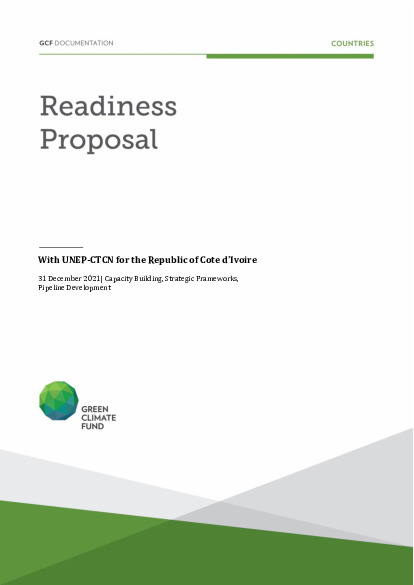Technical Guidance for Updating Technology Needs Assessment (TNA) and development of a Technology action plan for the implementation of NDC’ Côte d’Ivoire

Technical Guidance for Updating Technology Needs Assessment (TNA) and development of a Technology action plan for the implementation of NDC’ Côte d’Ivoire
This proposal seeks to provide technical assistance to the Government of Côte d’Ivoire to update its Technology Needs Assessment (TNA) and develop a Technology Action Plan (TAP) for prioritized technologies to address climate change challenges in the most critical sectors of the economy.
This Readiness Proposal, should it be implemented, will allow to:
a) setting up a national innovation system which will be a permanent framework to boost and facilitate the collaboration, incubation and partnership of key institutions and actors throughout the technology transfer chain, including endogenous options. This system is referred to as the Inclusive Climate Technology Innovation System (ICTIS);
b) facilitating the coherent implementation of the various national initiatives (Revision of the NDC, GCF Country Program, NAP). This objective will be achieved through the creation of a climate technology incubation hub that will act as the administrator of the ICTIS;
c) developing a Technology Action Plan for the prioritized sectors (up to 4) and;
d) contributing to the commitment of local authorities (regions, municipalities, and districts) and the private sector by supporting the identification of technologies and the development of appropriate concept notes, the definition of a resource mobilization strategy and market analysis deployment strategies.
To date, major sectoral, policy, institutional, financial and capacity challenges prevent the country from strengthening its climate change preparedness, and the achievement of climate adaptation and mitigation goals are hindered by the low capacity of national experts for developing proposals, the weak coordination and functioning of national climate bodies and key actors (research, territorial district, private actors, academia), the absence of functional national direct accredited entity, the insufficient and low coordination of financial resources to develop and deploy climate technologies at national scale.
If Côte d’Ivoire prioritizes low emission and adaptation technologies and sectors to enable it to meet its NDC, then this will result in reduced greenhouse gas emissions, a resilient economy and greater access to climate finance because Côte D’Ivoire will have assessed its technology needs, action plans and frameworks required to develop more bankable projects and solutions.